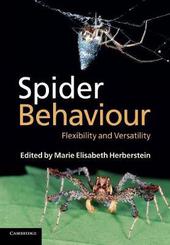
|
Spider Behaviour: Flexibility and Versatility
Paperback / softback
Main Details
| Title |
Spider Behaviour: Flexibility and Versatility
|
| Authors and Contributors |
Edited by Marie Elisabeth Herberstein
|
| Physical Properties |
| Format:Paperback / softback | | Pages:416 | | Dimensions(mm): Height 244,Width 173 |
|
| Category/Genre | Animal behaviour
Zoology - Invertebrates
Arachnids
Insects |
|---|
| ISBN/Barcode |
9780521749275
|
| Classifications | Dewey:595.4415 |
|---|
| Audience | | Professional & Vocational | |
|---|
| Illustrations |
5 Tables, black and white; 16 Plates, color; 21 Halftones, black and white; 11 Line drawings, black and white
|
|
Publishing Details |
| Publisher |
Cambridge University Press
|
| Imprint |
Cambridge University Press
|
| Publication Date |
27 January 2011 |
| Publication Country |
United Kingdom
|
Description
Spiders are often underestimated as suitable behavioural models because of the general belief that due to their small brains their behaviour is innate and mostly invariable. Challenging this assumption, this fascinating book shows that rather than having a limited behavioural repertoire, spiders show surprising cognitive abilities, changing their behaviour to suit their situational needs. The team of authors unravels the considerable intra-specific as well as intra-individual variability and plasticity in different behaviours ranging from foraging and web building to communication and courtship. An introductory chapter on spider biology, systematics and evolution provides the reader with the necessary background information to understand the discussed behaviours and helps to place them into an evolutionary context. Highlighting an under-explored area of behaviour, this book will provide new ideas for behavioural researchers and students unfamiliar with spiders as well as a valuable resource for those already working in this intriguing field.
Author Biography
Marie Elisabeth Herberstein is an Associate Professor in the Department of Biological Sciences at Macquarie University, Sydney. Her research investigates a range of behaviours in spiders including web building, learning, mating (including sexual cannibalism) and the use of deceptive signals.
Reviews'I consider this book to be as seminal as Choe and Crespi's edited volumes ... enormously valuable to graduate students searching for research projects ... established behavioural researchers who specialize on spiders will find the book to be an excellent resource. At the recent Animal Behavior Society meeting, at a 'Spider Lunch', a diverse group of my arachnological colleagues raved about how marvelous this book is. I learned a great deal from it, even in areas that I follow with regularity. The book will also be of interest to a wide range of animal behaviourists, regardless of their research organism. Researchers and lecturers without an arachnid background can use this book to get up to speed.' Animal Behaviour 'This volume boasts a dream team of authors, including rising stars and field luminaries, each summarizing their respective fields. The book emphasizes the flexibility, versatility, and sheer diversity of spider behavior. Generally, it takes on the daunting task of summarizing all of spider behavior with remarkable finesse. One of the volume's most impressive feats is its attention to the recent literature in rapidly moving subfields. Doubtlessly the text is destined to serve a valuable reference for both arachnologists and behaviorists. Personally, I know I will be assigning this volume to both undergraduate and graduate students for years to come. I suspect so will many others.' Jonathan N. Pruitt, The Quarterly Review of Biology '... well written and very well edited ... I thoroughly enjoyed reading the book, and recommend it for anyone wishing to gain a good understanding of spiders in general, and their behaviours in particular.' B. Staffan Lindgren, Bulletin of the Entomological Society of Canada
|